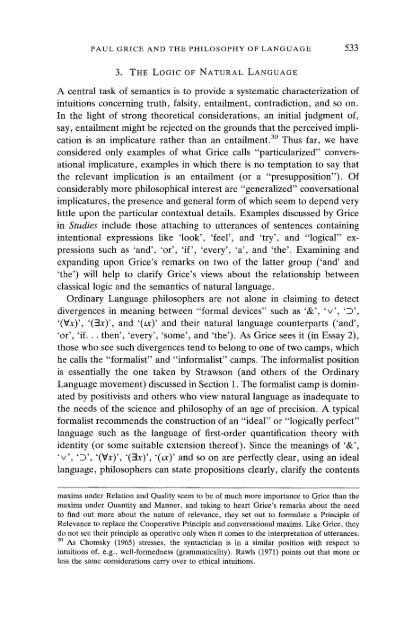Paul Grice and the philosophy of language
Paul Grice and the philosophy of language
Paul Grice and the philosophy of language
Create successful ePaper yourself
Turn your PDF publications into a flip-book with our unique Google optimized e-Paper software.
PAUL GRICE AND THE PHILOSOPHY OF LANGUAGE 533<br />
3. THE LOGIC OF NATURAL LANGUAGE<br />
A central task <strong>of</strong> semantics is to provide a systematic characterization <strong>of</strong><br />
intuitions concerning truth, falsity, entailment, contradiction, <strong>and</strong> so on.<br />
In <strong>the</strong> light <strong>of</strong> strong <strong>the</strong>oretical considerations, an initial judgment <strong>of</strong>,<br />
say, entailment might be rejected on <strong>the</strong> grounds that <strong>the</strong> perceived implication<br />
is an implicature ra<strong>the</strong>r than an entailment. 3° Thus far, we have<br />
considered only examples <strong>of</strong> what <strong>Grice</strong> calls "particularized" conversational<br />
implicature, examples in which <strong>the</strong>re is no temptation to say that<br />
<strong>the</strong> relevant implication is an entailment (or a "presupposition"). Of<br />
considerably more philosophical interest are "generalized" conversational<br />
implicatures, <strong>the</strong> presence <strong>and</strong> general form <strong>of</strong> which seem to depend very<br />
little upon <strong>the</strong> particular contextual details. Examples discussed by <strong>Grice</strong><br />
in Studies include those attaching to utterances <strong>of</strong> sentences containing<br />
intentional expressions like 'look', 'feel', <strong>and</strong> 'try', <strong>and</strong> "logical" expressions<br />
such as '<strong>and</strong>', 'or', 'if', 'every', 'a', <strong>and</strong> '<strong>the</strong>'. Examining <strong>and</strong><br />
exp<strong>and</strong>ing upon <strong>Grice</strong>'s remarks on two <strong>of</strong> <strong>the</strong> latter group ('<strong>and</strong>' <strong>and</strong><br />
'<strong>the</strong>') will help to clarify <strong>Grice</strong>'s views about <strong>the</strong> relationship between<br />
classical logic <strong>and</strong> <strong>the</strong> semantics <strong>of</strong> natural <strong>language</strong>.<br />
Ordinary Language philosophers are not alone in claiming to detect<br />
divergences in meaning between "formal devices" such as '&', 'v', 'D',<br />
'(Vx)', '(3x)', <strong>and</strong> '(tx)' <strong>and</strong> <strong>the</strong>ir natural <strong>language</strong> counterparts ('<strong>and</strong>',<br />
~or', 'if... <strong>the</strong>n', 'every', 'some', <strong>and</strong> '<strong>the</strong>'). As <strong>Grice</strong> sees it (in Essay 2),<br />
those who see such divergences tend to belong to one <strong>of</strong> two camps, which<br />
he calls <strong>the</strong> "formalist" <strong>and</strong> "informalist" camps. The informalist position<br />
is essentially <strong>the</strong> one taken by Strawson (<strong>and</strong> o<strong>the</strong>rs <strong>of</strong> <strong>the</strong> Ordinary<br />
Language movement) discussed in Section 1. The formalist camp is dominated<br />
by positivists <strong>and</strong> o<strong>the</strong>rs who view natural <strong>language</strong> as inadequate to<br />
<strong>the</strong> needs <strong>of</strong> <strong>the</strong> science <strong>and</strong> <strong>philosophy</strong> <strong>of</strong> an age <strong>of</strong> precision. A typical<br />
formalist recommends <strong>the</strong> construction <strong>of</strong> an "ideal" or "logically perfect"<br />
<strong>language</strong> such as <strong>the</strong> <strong>language</strong> <strong>of</strong> first-order quantification <strong>the</strong>ory with<br />
identity (or some suitable extension <strong>the</strong>re<strong>of</strong>). Since <strong>the</strong> meanings <strong>of</strong> '&',<br />
'v', 'D', '(Vx)', '(3x)', '(oc)' <strong>and</strong> so on are perfectly clear, using an ideal<br />
<strong>language</strong>, philosophers can state propositions clearly, clarify <strong>the</strong> contents<br />
maxims under Relation <strong>and</strong> Quality seem to be <strong>of</strong> much more importance to <strong>Grice</strong> than <strong>the</strong><br />
maxims under Quantity <strong>and</strong> Manner, <strong>and</strong> taking to heart <strong>Grice</strong>'s remarks about <strong>the</strong> need<br />
to find out more about <strong>the</strong> nature <strong>of</strong> relevance, <strong>the</strong>y set out to formulate a Principle <strong>of</strong><br />
Relevance to replace <strong>the</strong> Cooperative Principle <strong>and</strong> conversational maxims. Like <strong>Grice</strong>, <strong>the</strong>y<br />
do not see <strong>the</strong>ir principle as operative only when it comes to <strong>the</strong> interpretation <strong>of</strong> utterances.<br />
3o As Chomsky (1965) stresses, <strong>the</strong> syntactician is in a similar position with respect to<br />
intuitions <strong>of</strong>, e.g., well-formedness (grammaticality). Rawls (1971) points out that more or<br />
less <strong>the</strong> same considerations carry over to ethical intuitions.














